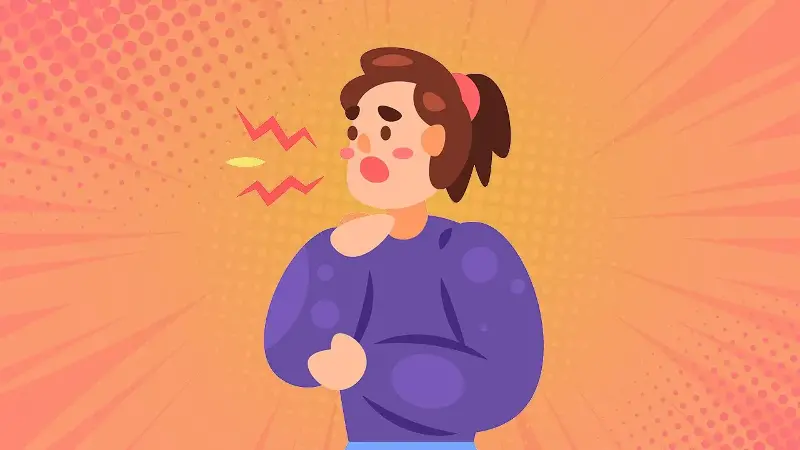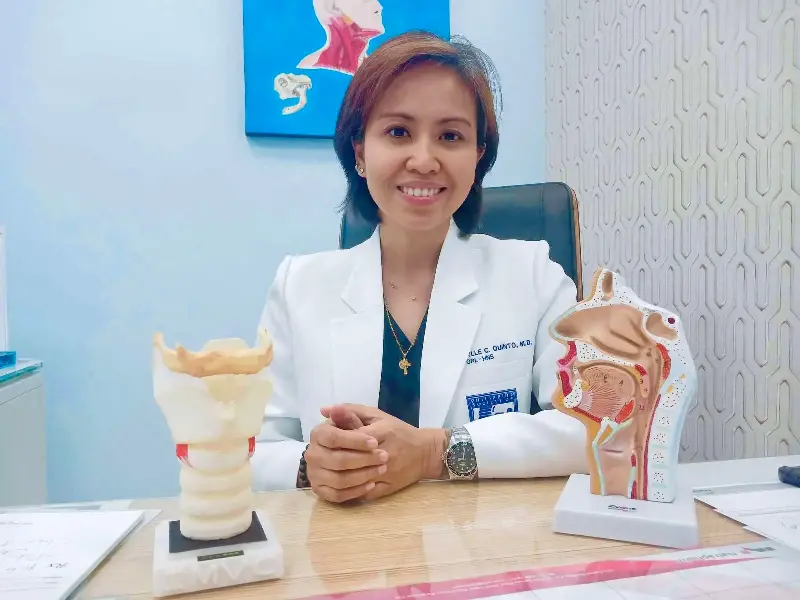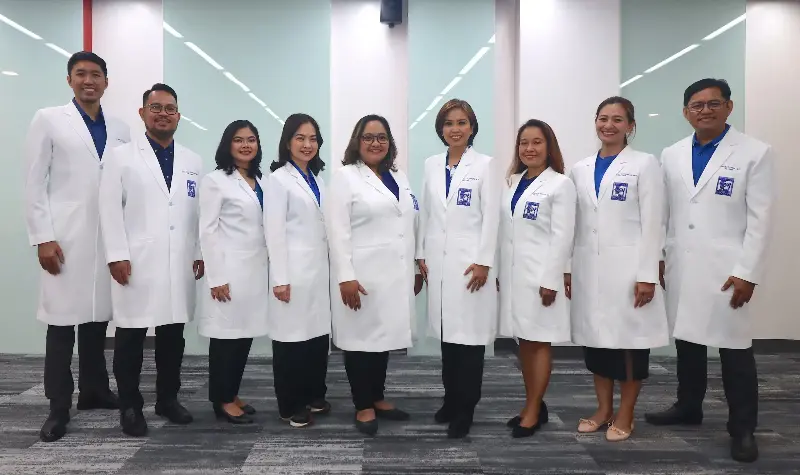
“The worst thing is if it’s cancerous,” this was the grim warning of Dr. Maria Shamylle Quinto about ignoring dysphonia, which is the condition of having the voice sounding unusual.
Dysphonia can have many causes, with cancer being one. The cancer’s lethality is matched with an equally drastic intervention, says Quinto.
But not all dysphonia is life threatening. In fact, just like the fabled overworked horse, the voice might just need proper time to rest and recover.
“The vocal cords generate sound through movement. This movement creates friction between contact points of the vocal cords. Continued friction due to misuse and abuse could eventually cause calluses, or benign lesions to grow — making you hoarse,” she explains.
Quinto — an ENT-HNS (ear, nose, throat – head and neck surgeon) subspecializing in laryngology (study of the voice box) and phonosurgery (voice-related surgery) — says another possible cause for dysphonia is just simply getting sick.
“When patients acquire allergic rhinitis or upper respiratory tract infection, they become predisposed to breathe through the mouth, thereby introducing dry air to the vocal cords,” she notes.
“This opens the possibility for viral or bacterial infection which can lead to laryngitis, or inflammation of the vocal cords.”
The simple solution? “Adequate voice rest, not more than two weeks. Not total silence. Just a soft voice, not a whisper,” instructs Quinto.
The reason? The same reason we find smaller muscles in arms with casts.
“The vocal cords are like any other muscle. If you’re not using it, it atrophies,” she says.
Quinto also advises proper hydration, “Dehydration predisposes your vocal cords to more irritation.”
Up the spout
Dysphonia could also be caused by the irritation of the vocal cords.
“This is where acid reflux comes in,” explains Quinto. “This usually happens if the patient is overweight: when the patient lies flat on the bed, the abdominal fat becomes weight that presses on the (lower esophageal) sphincter. This will allow acid to flow up the esophagus (food pipe), and reach the larynx (vocal cords), hence, reflux ensues.”
Patients with laryngopharyngeal reflux, she says, “feel like their throat is dry, accompanied by a sour or bitter taste.”
To resolve this, Quinto suggests, “Don’t lie down at once, especially after eating. When sleeping, use a moderate to high back-rest so that your sphincter isn’t pressed on.”
However, Quinto notes that for some people, this may not be enough.
“Some people have chronic reflux even when awake. This causes them to cough violently, as if they had asthma,” she says.
In this case, the patient has to take strict measures for the self.
“Stop coffee, tea, milk, anything acidic and anything spicy, especially when prescribed medicines. The patient should strictly adhere to this for two weeks,” Quinto advises.
“After the stomach has rested, the patient can resume consuming those, but only in moderation.”
Two weeks’ notice
If one finds that their voice is still off after two weeks,. Quinto says it’s time to visit a voice-specialized doctor.
Quinto is the current chair of the Philippine Academy of Laryngobronchoesophagology and Phoniatrics (PALP), a subspecialty academy under the Philippine Society of Otorhinolaryngology – Head and Neck Surgery (PSO-HNS).
PALP’s focus is on the airway, swallowing, and the voice.

“We strongly advise to visit an ENT-HNS who specializes in voice care. The doctors of PALP are specialized for these situations,” she says.
Quinto recalls an experience that helps her diagnose vocal diseases.
“In Japan, I was able to see patients with spasmodic dysphonia on a weekly basis. It’s a disease that makes one feels like being choked on the neck. Eventually, just by hearing, I already knew which people were suffering from it,” she shares.
For reference, Quinto informs of the newer specialization naming system, noting that EENTs (eyes, ears, nose and throat) are different from ENT-HNS specialists, while eye specialists are called ophthalmologists.
“The HNS is added in our specialty, from ENT to ENT-HNS, because we now specialize in Head and Neck Surgery also. ORL-HNS is the alternative technical name of ENT-HNS,” she says.
What if it’s cancer?
Cancer is one of the possible causes for dysphonia that lasts longer than two weeks.
Quinto differentiates the stages: “If it’s stage 3 or 4, sometimes you really have to go with total laryngectomy. If it’s stage 1 or 2, sometimes you just need to remove the tumor by laser therapy, and follow it up with radiation therapy.”
“If it’s stage 4, the gold standard is to remove the voice box completely — total laryngectomy,” she says.
Quinto also practices as an in-house surgeon at Isshiki Memorial Voice Center Manila (IMVC Manila), the first international offshoot of IMVC — a Japanese specialty voice center located in Kyoto that offers Isshiki thyroplasties (specialized voice box cartilage surgeries) and other glottoplasty (voice modification) procedures.

After the cancer removal, Quinto notes the grueling ordeal that typically follows.
“I personally advocate doing primary voice reconstruction after total laryngectomy, since this was also what was taught to me during my training, and I honestly can still see its advantages in a developing country,” she explains.
“Some patients choose the electrolarynx, others decide on the prosthesis. After that, radiation therapy, followed by swallowing and voice rehabilitation.”
It doesn’t have to end this way though. If intercepted early, cancer-caused dysphonia can involve less drastic treatment.
Benign lesions
For benign lesions, they can be so stubborn that even two weeks of rest won’t resolve them.
“Benign lesions like nodules, polyps and cysts, they’re not cancerous. Some polyps and cysts, however, have to be removed via surgery.,” she says.
“After that, the speech and language pathologist, the SLP, will coach the patient to speak properly to avoid the vocal misuse and abuse that forms the lesions in the first place.”
However, not all benign lesions are caused by vocal misuse and abuse.
“HPV-caused lesions spread through unusual sexual practice. They are difficult, because when you remove them, they could come back,” Quinto notes.
“There are some studies that show that the HPV vaccine could help. In that case, I refer the patient to specialists more familiar with its administration.”
Voice health advice
Any person can take immediate steps to avoid dysphonia.
“Hydration is very important,” explains Quinto. “When it comes to the vocal cords, the more hydrated it is, the more resilient it is to infection or any irritation.”
Patients who are taking vitamins or medicine should especially increase water intake. As Quinto notes, “Vitamin C is okay, but if it’s too much, it could cause dehydration of the vocal cords. Allergic medication could decrease salivary secretion and also cause vocal cord dehydration.”
Treating the voice like a muscle is important for voice health. “Since the vocal cords are also made up of muscles, they also get fatigued. If you don’t do proper vocal warm-up, they cannot achieve proper blood circulation.”
When it comes to drinking cold water, Quinto specifically prohibits it after intense vocal use.
“If you already warmed up, and you used your voice for a long time, then you drink cold water, that’s not good. That’s why it’s a no-no for singers,” she says.
Smoking is still unhealthy, with Quinto noting the statistics: “Laryngeal cancer is the third leading cause of head and neck cancer, and it’s caused by smoking.”
“Alcohol, it’s okay in moderation. However, smoking is potentiated with alcohol,” she adds. “When you drink and smoke, if you have the gene for it, it could activate cancer cells.”
While there are measures to give one a voice after having their voice box removed, Quinto still hopes that people could avoid the situation in the first place.
“We had patients who we did voice reconstruction, and they could talk. However, they still ended up depressed because they knew their voice just wasn’t the same,” she shares.
“It’s true that your voice is your identity, your power. Take care of it.” – Rappler.com
Anyone experiencing dysphonia, vocal discomfort, or swallowing and airway problems may find a doctor affiliated with PALP through this link: bit.ly/3YmgXbN?r=qr.
